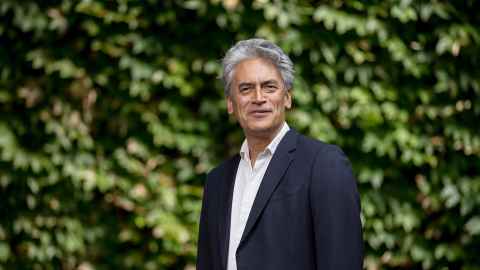Human rights used to limit Māori governance - academic
26 August 2025
Human rights, meant to protect, are ironically being used to block Māori authority, says law expert Andrew Erueti.

Human rights law is being used in Aotearoa New Zealand to block Māori aspirations, according to new research by Auckland Law School Associate Professor Andrew Erueti (Ngāti Ruanui, Te Āti Haunui-a-Pāpārangi).
The research, 'Indigenous Rights Beyond the Liberal Frame', explores how governments in Aotearoa have drawn on the language of ‘equality’, ‘non-discrimination’ and ‘one law for all’ to resist calls for a Māori authority and constitutional transformation.
Erueti says the research highlights who holds authority and how it’s being used.
“It’s about power, who holds it, and who gets to decide what justice looks like in this country,” he says.
At the heart of the debate is tino rangatiratanga, a foundational term in Te Tiriti o Waitangi, often translated as self-determination or sovereignty. It generally refers to the right of Māori to make decisions for themselves, according to their own tikanga (customary laws) and systems of authority, which differ from the Pākehā world.
While the Treaty promised that Māori would retain control over their lands, resources and affairs, Erueti says the Crown has historically interpreted this promise narrowly, often reducing Māori authority to consultation or limited participation in state systems.
Erueti’s research traces how this pattern has continued in modern times, even as New Zealand has made progress in recognising Indigenous rights through Treaty settlements, including co-governance of rivers, parks and maunga.
But he says human rights have now become a double-edged sword.
“While human rights are widely seen as tools for justice and fairness, the research reveals a paradox: the same principles designed to protect against discrimination are now being used to actually block Māori-led initiatives.”
While some are saying this is about special treatment, it’s actually about recognising the original agreement between Māori and the Crown and ensuring that Māori have the power to make decisions that affect their lives and communities
During the international negotiations for the UN Declaration on the Rights of Indigenous Peoples (UNDRIP), Erueti says New Zealand – and other countries like Australia, Canada, and the US – pushed for a definition of Indigenous rights that emphasised individual equality and cultural rights over collective autonomy.
“Instead of recognising Indigenous peoples as self-governing nations with their own authority, governments invoked human rights to limit Indigenous peoples’ aspirations for self-determination. But that erases the unique political status of Indigenous peoples under international law – and under Te Tiriti.”
This tension is playing out today in national politics.
In recent years, Māori have advocated for increased decision-making in regards to health, education, justice and environmental policy, and particularly in areas where there are glaring inequities for Māori communities.
Initiatives such as the now-disbanded Māori Health Authority (Te Aka Whai Ora), or constitutional reform proposals in Matike Mai and He Puapua, have called for decision-making power to be shared between Māori and the Crown, in recognition of the Treaty relationship.
But these moves have been met with fierce political resistance. Critics describe them as “separatist,” “divisive,” or “race-based,” often invoking the language of universal human rights to justify dismantling them.
“While some are saying this is about special treatment, it’s actually about recognising the original agreement between Māori and the Crown and ensuring that Māori have the power to make decisions that affect their lives and communities”
What does real self-determination look like?
Erueti contrasts two competing models for understanding Indigenous rights: a liberal model, based on equal treatment under the law, which tends to limit Māori authority; and a decolonisation model, which recognises that Māori held political authority long before the state existed.
“And that self-determination means restoring that authority on Māori terms,” he adds.
He says that while human rights have helped address some injustices – such as in the Foreshore and Seabed case – they have also been used to shrink the scope of tino rangatiratanga, especially when Māori calls for co-governance challenge the state's monopoly on power.
Reimagining the Treaty relationship
Far from calling for separatism or division, Māori leaders and legal scholars have proposed models for constitutional transformation grounded in tikanga Māori and a genuine partnership between the Crown and Māori.
For example, the Matike Mai report, produced by iwi leaders and constitutional experts, suggests a model with “three spheres” of influence:
- A rangatiratanga sphere: where Māori make decisions for Māori;
- A kāwanatanga sphere: where the Crown governs its own affairs; and
- A relational sphere: where both parties work together as equals.
These models reflect the original intent of Te Tiriti o Waitangi: not the absorption of Māori into Crown structures, but a respectful relationship between two political authorities.
“Real justice means more than equal treatment,” says Erueti. “It means recognising the histories, relationships and political authority of Indigenous peoples – and being willing to share power.”
Media contact
Te Rina Ruka-Triponel | Kaitohutohu Pāpāho Māori
E: te.rina.triponel@auckland.ac.nz